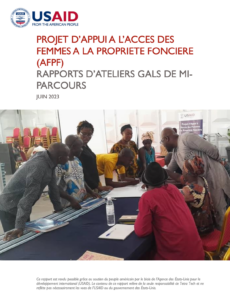 L’objectif du Projet d’Appui à l’Accès des Femmes à la Propriété Foncière (USAID AFPF) est d’accroître la cohésion sociale, de réduire les conflits fonciers et de donner aux femmes les moyens de contribuer économiquement à leurs communautés en renforçant leur accès légal à la terre dans les régions du Nord et de l’Ouest de la Côte d’Ivoire (CDI). Le projet AFPF atteindra ce but par le biais de deux objectifs de performance :
L’objectif du Projet d’Appui à l’Accès des Femmes à la Propriété Foncière (USAID AFPF) est d’accroître la cohésion sociale, de réduire les conflits fonciers et de donner aux femmes les moyens de contribuer économiquement à leurs communautés en renforçant leur accès légal à la terre dans les régions du Nord et de l’Ouest de la Côte d’Ivoire (CDI). Le projet AFPF atteindra ce but par le biais de deux objectifs de performance :
Objectif 1 – Renforcer l’autonomie des communautés dans les régions du Nord et de l’Ouest de la CDI par des campagnes de sensibilisation, de plaidoyer et de communication sur les droits fonciers et les droits des femmes dans les régions de l’Ouest et du Nord de la CDI ; et
Objectif 2 – Renforcer l’accès des femmes aux services juridiques et de médiation des conflits dans les zones rurales et urbaines afin de garantir leur accès à la terre dans les régions du Nord et de l’Ouest de la CDI.
Dans le cadre des activités de démarrage et de mise en œuvre du projet, le Système d’Apprentissage Action Participatif pour le Genre, plus connu par son nom en anglais, le Gender Action Learning System (GALS) a été mobilisé comme porte d’entrée dans les zones d’intervention du projet (Nord et Ouest). Cette méthodologie GALS adaptée au contexte ivoirien comporte trois phases de transformation pour l’instauration d’une justice du genre avec l’aide d’outils visuels participatifs.
A ce stade du processus, les deux premières phases ont fait l’objet de mise en œuvre.
Phase 1 : Ateliers catalyseurs et suivi des plans d’action individuels (Mai-Juillet 2022).
Dans cette première phase, le projet AFPF a organisé des ateliers d’initiation aux outils GALS avec 4 participants par village cible (120 personnes, dont la moitié femmes et l’autre moitié hommes). Au terme de ces ateliers, les participants ont individuellement élaboré un plan d’action personnel qui a été suivi par les agents de terrain des partenaires locaux. Pendant ces ateliers, les 5 outils de base de GALS ont été introduits, à savoir :
– La route vers la vision qui permet d’identifier ses objectifs économiques sur un an découpé en sous-périodes de trois mois ;
– L’arbre de l’équilibre genre qui permet d’identifier et analyser la répartition des tâches, l’accès et le contrôle des ressources, des dépenses et le processus de prise de décision dans le ménage ;
– Le diamant de rêve qui permet de faire ressortir les violences basées sur le genre ainsi que des changements souhaités dans les rapports interpersonnels dans le couple;
– La carte de leadership et de l’autonomisation qui permet d’analyser son réseau social et identifier des personnes pour partager les premiers outils GALS dans la perspective de démultiplication ;
– La route vers la vision à voies multiples qui fait la synthèse des engagements sur le plan économique (voie 1), les dynamiques genre (voie 2) et partage des outils dans son réseau social (voie 3).
A la fin de cette première phase, le projet AFPF a organisé des auto-évaluations pour chaque champion GALS puis des ateliers d’examen participatif du genre. Lors de l’atelier d’examen participatif, deux participants par village ont été invités pour faire un bilan de la mise en œuvre de leurs plans d’action et faire la transition vers la phase 2.
Phase 2 : Organisation des activités communautaires (Septembre 2022-Mars 2023). De retour des ateliers d’examen participatifs du genre qui se sont déroulés en présence de la consultante internationale GALS, les agents communautaires ont procédé à la sélection des premiers groupements pour participer à la deuxième phase GALS. Cette étape de sélection a permis de déclencher le processus de révision des premiers outils GALS avec les membres des différents groupements. C’est ainsi que la formation sur les nouveaux outils GALS de la phase 2 a démarré. Ces formations se sont déroulées globalement sur la période de novembre 2022 à mars 2023. Toujours dans la même optique, les points focaux GALS ont organisé des séances d’approfondissement de ces outils avec chaque membre des groupements. Ce processus de formation a été sanctionné par la réalisation d’une route vers la vision à voies multiples collectif spécifique à chaque groupement (les plans d’actions collectifs).
Par ailleurs, pour évaluer les plans d’actions collectifs produits par les groupements, un formulaire d’évaluation a été mis à la disposition des facilitateurs communautaires par l’équipe projet AFPF. Les formulaires ont été transmis une semaine après au projet pour revue technique et création d’une base de données des plans d’action. Les appuis matériels (voir Annexe 2) ont été identifiés à partir de ces plans d’action (routes vers à vision collective à voies multiples).
Phase 3 : Consolidation et constitution de réseau (1 an).
Le processus GALS se situe entre les phases 2 et 3 à ce stade de la mise en œuvre. Pour ce faire, l’objectif de l’atelier GALS objet du présent rapport était de faire un bilan du travail de la phase 1 qui continue, mais surtout de la phase 2 en cours de consolidation. Le but recherché était de renforcer le volet foncier car selon les évaluations faites par les agents communautaires, les visions collectives présentaient quelques insuffisances surtout à l’Ouest. C’est ainsi que l’équipe projet AFPF a décidé de renforcer les outils en lien avec le foncier, et aussi faire le lien entre les activités GALS et la campagne de vulgarisation et de sensibilisation en cours. Ainsi les champions GALS faciliteront un processus de mise à jour des plans d’action. En plus, les champions GALS participeront aux forums régionaux d’échanges et de coordination afin de catalyser la création d’un réseau de personnes engagées pour une justice du genre au niveau communautaire. C’est ainsi que l’activité a servi de pont entre la phase 2 qui porte sur les plans collectifs et la phase 3 qui porte sur la création d’un mouvement plus large.
1.2 OBJECTIFS ET ORGANISATION DES ATELIERS DE LANCEMENT DE LA PHASE 3 DU GALS
Les ateliers GALS des mois de mai 2023 qui se sont déroulés à Man et à Korhogo interviennent dans un contexte marqué par le lancement de la campagne de sensibilisation, de vulgarisation des textes et la fin de la phase 2 de GALS (activités avec les groupements).
Ces ateliers GALS avaient pour objectifs de :
– Réaliser l’auto-évaluation des plans d’actions individuels des points focaux GALS, des membres des associations/groupements et des points focaux genre et foncier ;
– Faire le bilan des évaluations des plans d’action collectifs des associations formés par les points focaux GALS et relever les axes d’amélioration, notamment la voie fonicière ; – Réviser la boîte à images AFPF (thèmes 2, 3 et 4) ;
– Réviser l’outil arbre des défis et solutions lié au foncier avec les points focaux GALS /Genre et Foncier afin d’améliorer les objectifs des associations en matière foncière ;
– Réviser et actualiser l’outil la Route vers la vision collective à voies multiples des associations ;
– Actualiser les objectifs annuels (route vers la vision, arbre de l’équilibre genre, diamant de rêve, carte de leadership et route vers la vision à voies multiples) ;
– Présenter les prochaines activités du projet AFPF à réaliser les 3 mois à venir ;
– Renforcer l’esprit d’équipe et la cohésion sociale entre les points focaux GALS et les points focaux genre et foncier.
Chaque atelier GALS a été organisé sous un format de trois (3) journées. La première journée avait pour but d’initier les points focaux communautaires GALS aux exercices d’auto-évaluation de leurs plans d’actions individuels d’une part et des membres des associations/groupements d’autres part. En outre, les points focaux genre et foncier ont eu la possibilité de faire des propositions à l’équipe projet relativement à la campagne de sensibilisation et de vulgarisation des textes en cours dans les différentes localités. Pour ce faire, l’outil Forces, Faiblesses, Opportunités et Menaces (FFOM) a été utilisé pour produire les résultats escomptés.
La deuxième journée s’imposait parce que l’analyse des plans d’actions collectifs des groupements féminins a permis de relever la faiblesse des voies foncières et organisationnelles de façon générale. L’objectif recherché cette deuxième journée était d’expliquer aux points focaux communautaires que le cœur du projet est le foncier. Par conséquent, la prise de conscience devra être effective au terme de ces ateliers GALS pour donner la chance aux points focaux de renforcer la voie foncière dans leurs plans d’actions individuels et plans d’actions collectifs.
Durant la troisième journée, les points focaux ont dû revoir et actualiser l’outil la Route vers la vision à voies multiples collective. Cette journée a été très importante car elle a permis aux points focaux d’adapter les plans d’actions collectifs des associations aux appuis matériels, techniques et organisationnels que le projet apportera les prochains mois c’est-à-dire dans la phase 3 du GALS.
Le présent rapport s’articule principalement autour de deux parties que sont :
La partie introductive qui présente le contexte et justification, les objectifs et l’organisation des ateliers et l’organisation du rapport.
La deuxième partie porte sur la présentation des principaux résultats obtenus par zone d’intervention à savoir l’ouest et le nord.



 The successful conservation of wildlife and the well-being of communities living adjacent to protected areas largely depends on the extent to which the communities and wildlife themselves can coexist. Where coexistence fails, human-wildlife conflicts (HWC) arise. Almost every country in the world faces some form of HWC, and highly biodiverse, developing countries like Zimbabwe particularly struggle with this issue. HWC is one of the major challenges experienced by communities living adjacent to wildlife areas across the country. HWC often severely impacts the livelihoods, security and wellbeing of the people who live alongside wildlife and whom we ask for support for wider conservation goals. Developing solutions for HWC has therefore become an urgent conservation priority in countries endowed with high biodiversity. Against this background, United States Agency for International Development (USAID) under its Resilience through Accelerating New Community-based Holistic Outcomes for Resource Sustainability (Resilience ANCHORS) Activity, commissioned a study which was conducted by [REDACTED] to understand HWC in communities living around wildlife areas in Zimbabwe.
The successful conservation of wildlife and the well-being of communities living adjacent to protected areas largely depends on the extent to which the communities and wildlife themselves can coexist. Where coexistence fails, human-wildlife conflicts (HWC) arise. Almost every country in the world faces some form of HWC, and highly biodiverse, developing countries like Zimbabwe particularly struggle with this issue. HWC is one of the major challenges experienced by communities living adjacent to wildlife areas across the country. HWC often severely impacts the livelihoods, security and wellbeing of the people who live alongside wildlife and whom we ask for support for wider conservation goals. Developing solutions for HWC has therefore become an urgent conservation priority in countries endowed with high biodiversity. Against this background, United States Agency for International Development (USAID) under its Resilience through Accelerating New Community-based Holistic Outcomes for Resource Sustainability (Resilience ANCHORS) Activity, commissioned a study which was conducted by [REDACTED] to understand HWC in communities living around wildlife areas in Zimbabwe.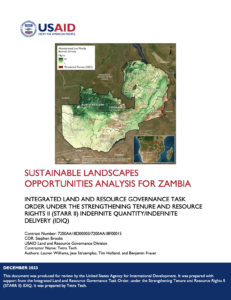 This report presents an assessment of land-based greenhouse gas (GHG) emissions mitigation opportunities in Zambia, with an aim to support decision-making for prioritizing sustainable landscape (SL) investments. The report emphasizes that effective land and resource governance is crucial for climate mitigation efforts, particularly in the forest sector. It combines biophysical analysis with an evaluation of policy and institutional frameworks to ensure that SL investments effectively support local systems and address governance challenges, thereby strengthening local ownership of interventions.
This report presents an assessment of land-based greenhouse gas (GHG) emissions mitigation opportunities in Zambia, with an aim to support decision-making for prioritizing sustainable landscape (SL) investments. The report emphasizes that effective land and resource governance is crucial for climate mitigation efforts, particularly in the forest sector. It combines biophysical analysis with an evaluation of policy and institutional frameworks to ensure that SL investments effectively support local systems and address governance challenges, thereby strengthening local ownership of interventions.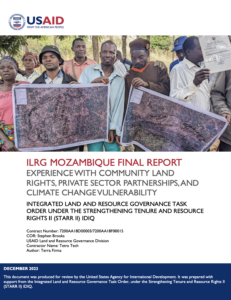 From 2018 – 2023, the United States Agency for International Development (USAID) supported efforts to document and strengthen community land use rights in Mozambique under the Integrated Land and Resource Governance (ILRG) program. This work was built on the earlier USAID-funded Responsible Land-Based Investment pilot project implemented from 2017-2018.
From 2018 – 2023, the United States Agency for International Development (USAID) supported efforts to document and strengthen community land use rights in Mozambique under the Integrated Land and Resource Governance (ILRG) program. This work was built on the earlier USAID-funded Responsible Land-Based Investment pilot project implemented from 2017-2018.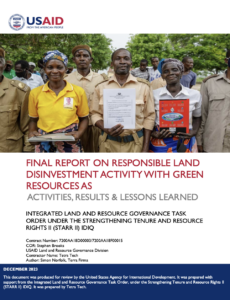 This report describes the implementation of activities to improve tenure security and resource ownership of communities potentially affected by the divestment of land areas by a forestry company that was undertaking a restructuring and consolidation process in respect to its landholdings in the north of Mozambique. Green Resources AS (GRAS) is a private Norwegian company founded in 1995 (under the name Fjordgløtt, subsequently renamed Tree Farms, and now known as Green Resources) by Mads Asprem, who is a leading entrepreneur and consultant in sustainable forest plantations and paper industries. It is focused on forest development and wood processing in East Africa and manages operations across Mozambique, Tanzania, and Uganda. It is the largest tree plantation company in Africa,1 excluding South Africa. GRAS notes that its mission “is to establish East Africa’s leading Forest Industry Company working for the benefit of its shareholders, employees and the communities where it operates.”
This report describes the implementation of activities to improve tenure security and resource ownership of communities potentially affected by the divestment of land areas by a forestry company that was undertaking a restructuring and consolidation process in respect to its landholdings in the north of Mozambique. Green Resources AS (GRAS) is a private Norwegian company founded in 1995 (under the name Fjordgløtt, subsequently renamed Tree Farms, and now known as Green Resources) by Mads Asprem, who is a leading entrepreneur and consultant in sustainable forest plantations and paper industries. It is focused on forest development and wood processing in East Africa and manages operations across Mozambique, Tanzania, and Uganda. It is the largest tree plantation company in Africa,1 excluding South Africa. GRAS notes that its mission “is to establish East Africa’s leading Forest Industry Company working for the benefit of its shareholders, employees and the communities where it operates.”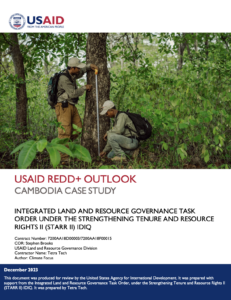 The United States Agency for International Development (USAID), through its missions and implementing partners, supports market-driven climate change mitigation initiatives based on protecting forest landscapes in various countries globally, including Cambodia. Known as REDD+ (reducing emissions from deforestation and forest degradation), these initiatives not only provide environmental and climate benefits, but also generate livelihood and social outcomes for rural, forest-dependent communities. Cambodia is a country that has received significant REDD+ support from USAID since 2012. USAID funding supports up to 10 REDD+ projects which cover key protected areas and forest landscapes.
The United States Agency for International Development (USAID), through its missions and implementing partners, supports market-driven climate change mitigation initiatives based on protecting forest landscapes in various countries globally, including Cambodia. Known as REDD+ (reducing emissions from deforestation and forest degradation), these initiatives not only provide environmental and climate benefits, but also generate livelihood and social outcomes for rural, forest-dependent communities. Cambodia is a country that has received significant REDD+ support from USAID since 2012. USAID funding supports up to 10 REDD+ projects which cover key protected areas and forest landscapes.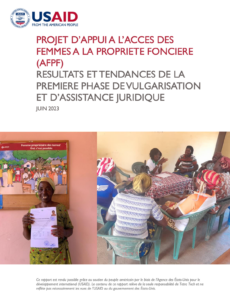 L’objectif du Projet d’Appui à l’Accès des Femmes à la Propriété Foncière (USAID AFPF) est d’accroître la cohésion sociale, de réduire les conflits fonciers et de donner aux femmes les moyens de contribuer économiquement à leurs communautés en renforçant leur accès légal à la terre dans les régions du Nord et de l’Ouest de la Côte d’Ivoire (CDI). Le projet AFPF atteindra ce but par le biais de deux objectifs de performance :
L’objectif du Projet d’Appui à l’Accès des Femmes à la Propriété Foncière (USAID AFPF) est d’accroître la cohésion sociale, de réduire les conflits fonciers et de donner aux femmes les moyens de contribuer économiquement à leurs communautés en renforçant leur accès légal à la terre dans les régions du Nord et de l’Ouest de la Côte d’Ivoire (CDI). Le projet AFPF atteindra ce but par le biais de deux objectifs de performance :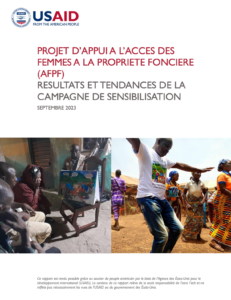 L’objectif du Projet d’Appui à l’Accès des Femmes à la Propriété Foncière (USAID AFPF) est d’accroître la cohésion sociale, de réduire les conflits fonciers et de donner aux femmes les moyens de contribuer économiquement à leurs communautés en renforçant leur accès légal à la terre dans les régions du Nord et de l’Ouest de la Côte d’Ivoire (CDI). Le projet AFPF atteindra ce but par le biais de deux objectifs de performance :
L’objectif du Projet d’Appui à l’Accès des Femmes à la Propriété Foncière (USAID AFPF) est d’accroître la cohésion sociale, de réduire les conflits fonciers et de donner aux femmes les moyens de contribuer économiquement à leurs communautés en renforçant leur accès légal à la terre dans les régions du Nord et de l’Ouest de la Côte d’Ivoire (CDI). Le projet AFPF atteindra ce but par le biais de deux objectifs de performance : L’objectif du Projet d’Appui à l’Accès des Femmes à la Propriété Foncière (USAID AFPF) est d’accroître la cohésion sociale, de réduire les conflits fonciers et de donner aux femmes les moyens de contribuer économiquement à leurs communautés en renforçant leur accès légal à la terre dans les régions du Nord et de l’Ouest de la Côte d’Ivoire (CDI). Le projet AFPF atteindra ce but par le biais de deux objectifs de performance :
L’objectif du Projet d’Appui à l’Accès des Femmes à la Propriété Foncière (USAID AFPF) est d’accroître la cohésion sociale, de réduire les conflits fonciers et de donner aux femmes les moyens de contribuer économiquement à leurs communautés en renforçant leur accès légal à la terre dans les régions du Nord et de l’Ouest de la Côte d’Ivoire (CDI). Le projet AFPF atteindra ce but par le biais de deux objectifs de performance :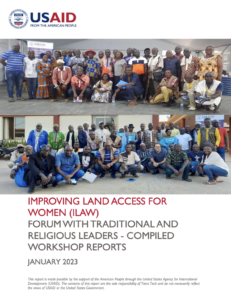 The goal of the Improving Land Access for Women (ILAW) Activity is to increase social cohesion, reduce land conflicts, and empower women to contribute to their communities economically by strengthening their legal access to land in the Northern and Western regions of Côte d’Ivoire (CDI). ILAW will achieve this goal through two performance objectives: Objective 1 – Empower communities in Northern and Western CDI through awareness raising, advocacy, and communication campaigns on land and women’s rights in Western and Northern CDI; and Objective 2 – Strengthen women’s access to legal and conflict mediation services in rural and urban areas to ensure their access to land in Northern and Western CDI.
The goal of the Improving Land Access for Women (ILAW) Activity is to increase social cohesion, reduce land conflicts, and empower women to contribute to their communities economically by strengthening their legal access to land in the Northern and Western regions of Côte d’Ivoire (CDI). ILAW will achieve this goal through two performance objectives: Objective 1 – Empower communities in Northern and Western CDI through awareness raising, advocacy, and communication campaigns on land and women’s rights in Western and Northern CDI; and Objective 2 – Strengthen women’s access to legal and conflict mediation services in rural and urban areas to ensure their access to land in Northern and Western CDI.